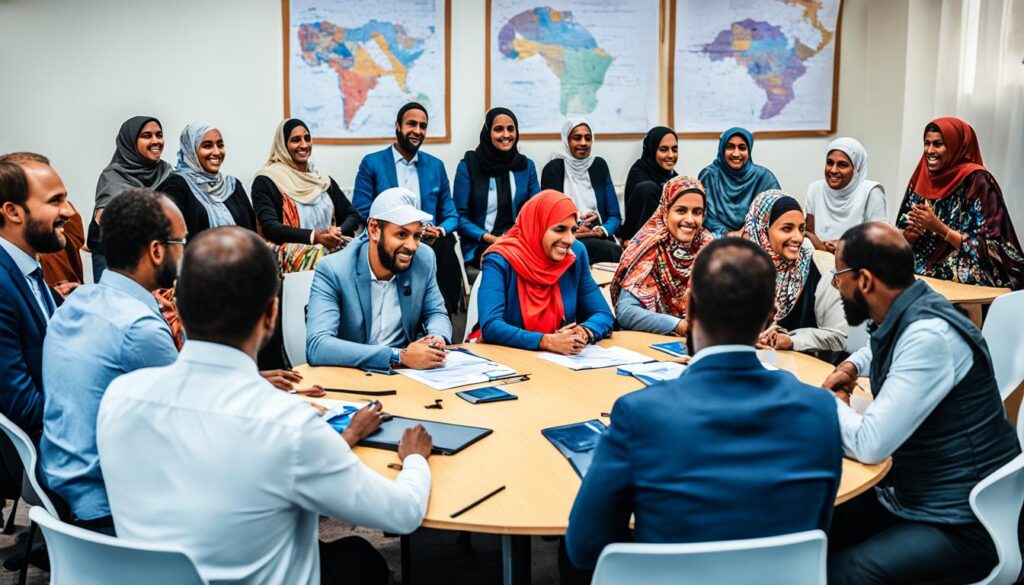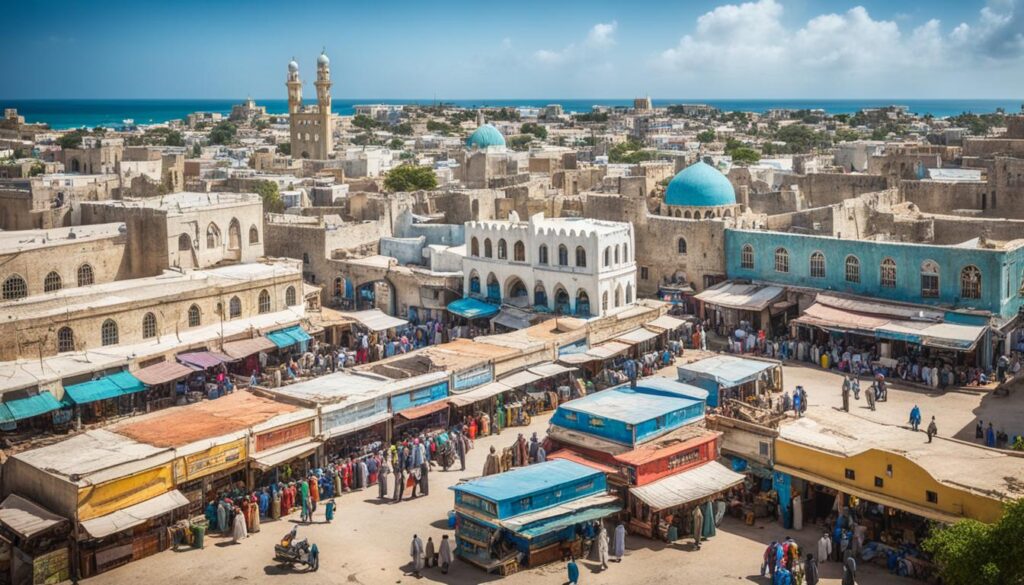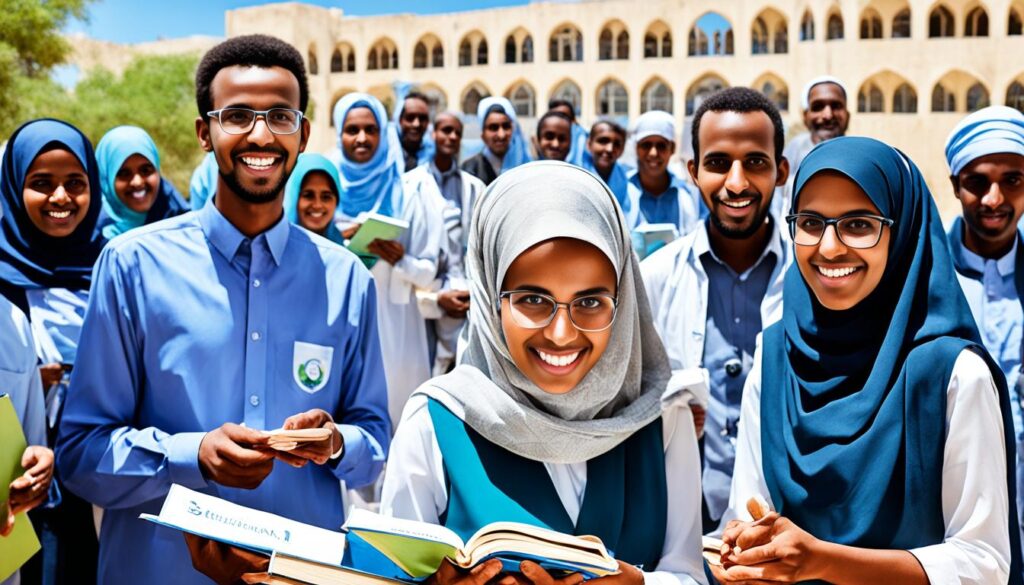Mogadishu, the capital and largest city of Somalia, is a fascinating hub for the study of Somali culture and the Horn of Africa region. Home to over 2.3 million people, this historic city has been a center of trade and cultural exchange since the 10th century, when it was one of the earliest Arab settlements on the East African coast. However, in recent decades, Mogadishu has faced significant challenges, including civil war, the rise of Islamic militias, and the ongoing threat of the Al-Shabaab insurgency.
Despite these obstacles, Mogadishu remains an important center for research and analysis on Somalia and the Horn of Africa. The city’s rich history, diverse culture, and strategic location make it a critical subject of study for scholars, policymakers, and those interested in understanding the region’s complex dynamics. From the impact of clan conflicts and famines to the influence of Somali piracy and humanitarian aid efforts, Mogadishu offers a wealth of insights into the social, political, and economic forces shaping the Horn of Africa.
Key Takeaways
- Mogadishu is the capital and largest city of Somalia, with a rich history dating back to the 10th century as an Arab settlement on the East African coast.
- The city has faced significant challenges in recent decades, including civil war, the rise of Islamic militias, and the ongoing threat of the Al-Shabaab insurgency.
- Despite these obstacles, Mogadishu remains an important center for research and analysis on Somalia and the Horn of Africa region.
- The city’s history, culture, and strategic location make it a critical subject of study for scholars and policymakers interested in understanding the complex dynamics of the Horn of Africa.
- Key areas of focus in Somali studies include the impact of clan conflicts, famines, Somali piracy, and humanitarian aid efforts.
Introduction to Somali Studies
Somali studies is a vibrant academic field that delves into the rich history, culture, and experiences of Somalia and the broader Horn of Africa region. This multidisciplinary area of study offers a deep understanding of the Somali people, their diaspora communities, and the complex socio-political and economic challenges they have faced over the decades.
Importance of Studying Somalia and the Horn of Africa
The strategic geopolitical location of Somalia and the Horn of Africa has long captured the attention of scholars and policymakers worldwide. The region’s rich cultural heritage, diverse ethnic groups, and unique linguistic traditions provide a fascinating lens through which to explore the intricate dynamics of Somali society. Furthermore, the region’s complex political landscape and the struggles of the Somali people have significant implications for global security and international relations.
Key Areas of Focus in Somali Studies
Somali studies encompasses a wide range of research areas, including the history of Somalia, the evolution of Somali culture and identity, the experiences of the Somali diaspora, the intricacies of Somali politics and economics, and the social structures and challenges within Somali communities. By delving into these key areas, scholars and researchers can contribute to a deeper understanding of the Somali people and the Horn of Africa, ultimately informing policies and interventions that can positively impact the region.
Institute for Somali Studies at Mogadishu University
The Institute for Somali Studies (ISOS) is a leading research center within Mogadishu University, established in 2001. As a non-profit organization, the ISOS is dedicated to generating in-depth knowledge and insights on Somalia, the Horn of Africa region, and Somali communities worldwide. By serving as a platform for sharing ideas, experiences, and critical analysis, the Institute plays a vital role in the recovery and rebuilding of Somalia, a country emerging from a devastating civil war.
History and Establishment of ISOS
The ISOS was founded in 2001 with the aim of reviving Somali studies and promoting research on the country and its people. Recognizing the need for a dedicated institution to explore the complexities of Somalia, the Institute has since grown to become a respected hub for Somali studies, Horn of Africa studies, and Somali knowledge generation.
Mission, Vision, and Core Values
The mission of the Institute for Somali Studies is to engage in the rebuilding of Somalia through rigorous research, knowledge production, and effective dissemination. Its vision is to become a leading institute for Somali studies, contributing to the understanding and development of the country and its people. The ISOS upholds core values of academic excellence, integrity, and a commitment to fostering inclusive dialogue and collaboration.

Research Initiatives and Programs
The Institute for Somali Studies (ISOS) at Mogadishu University takes pride in its robust research initiatives and programs. One of the standout platforms is the Cilmiwadaag, a monthly gathering where Somali experts, intellectuals, and decision-makers come together to share their knowledge and experience on crucial issues related to Somalia.
Cilmiwadaag Platform for Knowledge Sharing
The Cilmiwadaag platform, whose motto is “Investment in knowledge always serves the best interest,” provides a dynamic space for researchers and practitioners to present their Somali research and engage in critical discussions. This collaborative effort aims to foster a deeper understanding of Somalia and the Horn of Africa, while also facilitating knowledge sharing among the Somali community.
Through the Cilmiwadaag platform, the ISOS actively engages with Somali experts, intellectuals, and decision-makers, creating a vibrant ecosystem for knowledge exchange. This initiative ensures that the diverse perspectives and insights of the Somali community are captured and utilized to inform policies, strategies, and academic pursuits, ultimately benefiting the nation and the region as a whole.
Talowadaag Roundtable Discussions
The Institute for Somali Studies (ISOS) at Mogadishu University takes a multifaceted approach to Somali studies, including organizing the Talowadaag Roundtable, a quarterly forum for critical discourse on Somali policy, politics, economics, and society. This platform brings together scholars, activists, decision-makers, and prominent figures to bridge the gap between academic perspectives and the policymaking process.
The Talowadaag Roundtable, which translates to “Ideas for a Better Somalia,” reflects the institute’s commitment to creating a space conducive to open discussion on significant issues affecting the Horn of Africa region. Participants engage in lively debates and share insights on a range of topics, from Somali political developments to the economic and social challenges facing the country.

By fostering this inclusive dialogue, the ISOS aims to bridge the gap between scholarly viewpoints and the policy-making process. The Talowadaag Roundtable has become a respected platform for shaping constructive discussions and informing decision-makers on critical Somali and Horn of Africa issues.
Somalia: Horn of Africa Studies Mogadishu Somalia
Mogadishu, the vibrant capital of Somalia, has emerged as a strategic hub for the study of Somalia and the broader Horn of Africa region. As the seat of the Institute for Somali Studies (ISOS) and the home of Mogadishu University, this city has become a dynamic center for research, analysis, and knowledge generation on various aspects of Somali culture, history, and contemporary issues.
The city’s rich history, diverse cultural tapestry, and ongoing challenges provide a unique and multifaceted context for scholars and researchers to explore the complexities of this important region. From delving into the Somali language and literature to examining the geopolitical dynamics of the Horn of Africa, Mogadishu offers a wealth of opportunities for those interested in deepening their understanding of Somalia and the surrounding area.

Through the initiatives and programs of the ISOS, Mogadishu has become a hub for Somali studies, fostering collaborative research, knowledge sharing, and the development of the next generation of Somali scholars. By leveraging the city’s unique position, researchers and academics are able to gain invaluable insights into the intricate tapestry of Somali culture, history, and contemporary challenges, ultimately contributing to a more comprehensive understanding of this pivotal region of the African continent.
Somali Young Researchers Initiative (SYRI)
The Institute for Somali Studies (ISOS) at Mogadishu University has taken a proactive approach to nurturing the next generation of Somali scholars through its Somali Young Researchers Initiative (SYRI). Launched in 2014, this program aims to promote and train outstanding Somali students to engage in research within the field of Somali studies, particularly in the humanities and social sciences.
SYRI is a crucial initiative that seeks to explore and ignite the potential capacity of Somali young researchers. With the motto “Dig Deeper and Reach New Heights,” the program provides Somali students with the necessary resources, mentorship, and opportunities to delve into Somali studies and contribute to the ongoing development of this dynamic field.
Nurturing the Next Generation of Scholars
By investing in Somali young researchers, SYRI is playing a pivotal role in ensuring the continued growth and evolution of Somali studies. This initiative not only fosters the academic and research skills of Somali students but also instills in them a deep appreciation for the rich cultural, historical, and social fabric of their nation. As these young scholars embark on their academic journeys, they are poised to become the future leaders and innovators in the field of Somali studies, driving forward the understanding and appreciation of Somalia and the Horn of Africa.

Somali Studies Journal
The Somali Studies Journal is a renowned academic publication that serves as a platform for scholarly exploration of Somalia, the Horn of Africa, and the vibrant Somali diaspora communities worldwide. Published annually by the Institute for Somali Studies at Mogadishu University, this peer-reviewed journal is the first of its kind to originate from Somalia, making it a pivotal resource for Somali studies, Horn of Africa studies, and Somali research.
Aims, Scope, and Submission Guidelines
The primary aim of the Somali Studies Journal is to promote a deeper understanding of Somalia and the broader Horn of Africa region, with a particular focus on issues and topics relevant to the Somali people. The journal invites submissions from scholars and researchers both within and outside the Horn of Africa, encouraging a diverse range of perspectives and insights on Somali studies, Somali academia, and Somali publications.
The journal’s scope encompasses a wide array of subjects, including but not limited to history, politics, economics, culture, society, language, and the environment. Prospective authors are encouraged to explore these and other areas of Somali studies, contributing to the expansion of knowledge and the advancement of Somali research and scholarship.
Detailed submission guidelines and the journal’s editorial policies are available on the Institute for Somali Studies’ website, ensuring a streamlined and transparent process for authors wishing to contribute to the Somali Studies Journal.
Annual Conference on Somali Studies
The Annual Conference on Somali Studies (ACSOS) is a renowned platform organized by the Institute for Somali Studies (ISOS) at Mogadishu University. This conference provides a dynamic forum for academics, researchers, practitioners, and policymakers to present their work and engage in discussions on the latest developments and critical issues within the field of Somali studies. Launched in 2014, the ACSOS has become an essential event for the Somali studies community, fostering collaboration and the exchange of ideas among scholars from around the world.
The ACSOS covers a wide range of topics related to the Somali region and the Horn of Africa, including history, politics, economics, social issues, and cultural dynamics. Participants have the opportunity to share their research findings, engage in thought-provoking debates, and explore new avenues for collaboration. The conference has become a hub for the Somali academia, attracting renowned experts and emerging scholars who are dedicated to advancing the understanding of Somali studies.
Over the years, the ACSOS has played a crucial role in strengthening the global network of Somali studies researchers and practitioners. By providing a platform for the exchange of ideas and the dissemination of knowledge, the conference has contributed to the growth and development of the Somali studies field, fostering a deeper understanding of the region’s complexities and promoting evidence-based policymaking.
Mogadishu: Historical and Cultural Significance
Mogadishu, the capital and largest city of Somalia, boasts a rich and complex history that dates back to the 10th century. Originating as an Arab settlement, the city evolved into a major trading hub, engaging in commerce with various Arab states and, later, the Portuguese and the Sultanate of Zanzibar.
The city’s architecture reflects its diverse cultural heritage, blending Islamic and modern styles. Mogadishu became the capital of Italian Somaliland and the Somalia trust territory, eventually becoming the capital of independent Somalia in 1960. This transition marked a significant chapter in Somali history, as the country sought to forge its own identity and shape its future.
Origins and Evolution of the Capital City
Mogadishu’s origins can be traced to the 10th century, when it was an Arab settlement. Over the centuries, the city grew in importance as a trading hub, establishing connections with other Arab states and, later, the Portuguese and the Sultanate of Zanzibar. This diverse cultural exchange shaped the city’s architectural and social landscape.
Modern Developments and Challenges
In recent decades, Mogadishu has faced significant challenges, including the Somali civil war, the rise of Islamic militias, and the ongoing threat of the Al-Shabaab insurgency. These events have caused widespread destruction and humanitarian crises, testing the resilience of the Somali people. Despite these obstacles, the city continues to evolve, with efforts to rebuild and restore its cultural and architectural heritage.
Conclusion
The study of Somalia and the Horn of Africa region, centered in the city of Mogadishu, is a critical field of academic inquiry. The Institute for Somali Studies (ISOS) at Mogadishu University plays a vital role in generating knowledge, facilitating research, and promoting the analysis of key issues related to Somalia and the broader region. Through initiatives like the Cilmiwadaag platform, the Talowadaag Roundtable, the Somali Young Researchers Initiative, and the Somali Studies Journal, the ISOS is contributing to a deeper understanding of Somalia’s complex history, culture, and the multifaceted challenges it faces.
As the capital city and a hub of Somali studies, Mogadishu remains a significant location for scholars and researchers to explore the nuances of this vital region of Africa. The ISOS’s commitment to fostering Somali studies, promoting Somali research, and preserving Somali knowledge and culture is crucial in shaping a comprehensive understanding of this dynamic and resilient nation.
Moving forward, the continued support and expansion of the Somali studies ecosystem, anchored by institutions like the ISOS, will be instrumental in addressing the pressing issues facing Somalia and the Horn of Africa. By cultivating the next generation of Somali scholars and researchers, the ISOS is poised to play a pivotal role in the future development and progress of this remarkable region.
Source Links
- Who We Are – https://isos.so/index.php/2014-08-23-08-24-30/who-we-are
- Mogadishu | Capital of Somalia, Horn of Africa, Indian Ocean port – https://www.britannica.com/place/Mogadishu
- Institute for Somali Studies (ISOS) – Mogadishu University – https://mu.edu.so/institute-for-somali-studies-isos-2/


